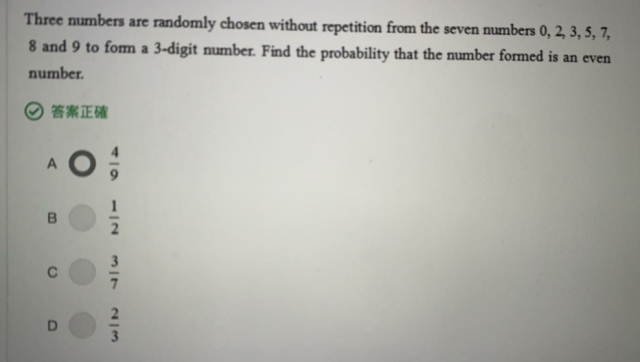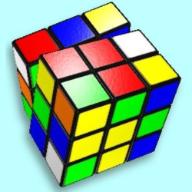Marths problem: I don't know why the answer is C, thanks?
2021-03-07 7:15 pm

回答 (3)
2021-03-07 7:41 pm
✔ 最佳答案
Do you mean to ask why the answer is not C? The correct answer is A, as indicated by the green check on your attached image.I gather that the first digit may not be zero. Otherwise I would have gone with C myself. In that case, there are six digits available for the first digit, two of which are even.
P(1st digit even) = 2/6 = 1/3
P(1st digit odd) = 4/6 = 2/3
As for the second digit, well, why should we care? Disregard the second digit.
The number is even if and only if the third digit is even. One digit has been eliminated. The distribution of the remaining digits depends on that first digit. This is a conditional probability, depending on the outcome of the first digit.
P(3rd digit even | 1st digit even) = 2/6 = 1/3
P(3rd digit even | 1st digit odd) = 3/6 = 1/2
P(even number)
= P(1st digit even ∩ 3rd digit even) + P(1st digit odd ∩ 3rd digit even)
= (1/3)(1/3) + (2/3)(1/2)
= 1/9 + 1/3
= 4/9
2021-03-07 10:00 pm
If the last digit is zero, then you have 6 choices for the first digit and 5 choices for the second digit → 30 numbers ending in zero.
If the last digit is not zero, then you have 5 choices for the first digit (can't have a leading zero) and 5 choices for the second digit → 25 numbers each ending in a non-zero digit.
So even numbers:
30 + 25 + 25 = 80
Total numbers:
30 + 6 * 25 = 180
P(even) = 80/180 = 4/9
Answer:
A) 4/9
If the last digit is not zero, then you have 5 choices for the first digit (can't have a leading zero) and 5 choices for the second digit → 25 numbers each ending in a non-zero digit.
So even numbers:
30 + 25 + 25 = 80
Total numbers:
30 + 6 * 25 = 180
P(even) = 80/180 = 4/9
Answer:
A) 4/9
2021-03-07 8:09 pm
The only digit that matters is the units digit, and all numbers are equally likely in that position.
There are three even numbers (0, 2, 8) out of seven numbers.
So 3/7 chance of the units digit being even.
There are three even numbers (0, 2, 8) out of seven numbers.
So 3/7 chance of the units digit being even.
收錄日期: 2021-04-24 08:41:43
原文連結 [永久失效]:
https://hk.answers.yahoo.com/question/index?qid=20210307111555AAv5yHt

